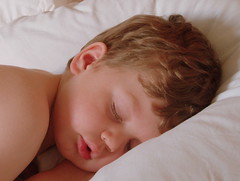Update: The fourth in a series of ten posts about gentle, effective ways to guide young children to become self disciplined.
A few words about exercise, rest, and nutrition, and their relationship to discipline.Whole books have been written on each of these topics, and while I don’t have time to write a book today, I want to offer some basic guidelines, and a few good resources for practical guidance. What I will say is this: Two of the most common causes of toddler temper tantrums and melt downs are not enough sleep, and/or hunger. Toddlers also have difficulty remaining co-operative and cheerful if they are cooped up for too long indoors, or don’t have enough opportunities to expend energy in positive ways though active play and exploration. Well rested and well nourished children who have predictable daily routines that include lots of active (outdoor if possible) play each day are generally happy, healthy, well behaved children. Daily rhythms, physical activity, good nutrition, and sleep are inter-related and interconnected. A child who spends lots of time running around outside in the fresh air will tend to have a better appetite, and sleep more soundly at night, as will a child who is not overstimulated or stressed by having to adapt to unpredictable changes in expectations or daily routines.
“RIE emphasizes the benefits of infants spending peaceful, uninterrupted time following their biological rhythms of falling asleep when sleepy and eating when hungry, rather than their having to adjust too soon to external schedules and unrealistic expectations. First, we have to let the child develop his own rhythm; and then later he can adjust more into adult life.” -Magda Gerber

Of course, every child is different, and has varying needs for sleep, but toddlers generally need 10 -12 hours of sleep each night AND a 1-3 hour nap every day. It is worth the time and energy it takes to help your child establish good sleep habits early on. If your toddler doesn’t nap, don’t feel guilty about setting a kitchen timer for an hour, and putting him in his room with a few books and special (quiet) toys that are taken out only for rest time.You both need and deserve this down time, and you will find that your toddler quickly learns to look forward to, and enjoy her quiet time (almost) as much as you do.
Resources -Sleep: Ending Toddler Bedtime Battles

Toddlers need to eat small amounts of nutritious food every two hours or so. Limit their intake of juice to no more than four ounces of 100 % pure, unsweetened fruit juice a day. Water will quench a toddler’s thirst far better than any other liquid, and won’t cause her to fill up on empty calories.
Your job as a parent is to offer nutritious foods at regular intervals throughout the day, and your child’s job is to decide how much he will eat. If he doesn’t eat well one day, he’ll make up for it the next, or the next. Try not to worry or engage in power struggles over food.
About “picky” eaters – who will only eat chicken nuggets or pizza, or whatever- ahem- YOU as a parent are in charge of the food you purchase, prepare and offer your child to eat. If you only provide fruits,vegetables, fish, yogurt, whole grains, and other healthy choices, this is what your child will learn to enjoy and eat. No two year old need ever know of the existence of chicken nuggets or french fries!
Resources Nutrition: Dr. Greene, White Out, Parenting To Prevent Childhood Obesity, and The Science Of Mom.

Try to get outside everyday-even if it’s only for fifteen minutes.(In New England, we often have winter weather that makes long periods of outdoor time almost impossible on some days.) The change of scene and fresh air are vital for your young child'(and for you!) Toddlers need lots of space to exercise their growing bodies.They also need the opportunity to burn off all their exuberant energy in a positive way. If you do nothing else, leave the stroller at home, and take a walk around your block or neighborhood- at your toddler’s pace, once every day – even in cold or rainy weather.
Resources: Outdoor Play: The Grass Stain Guru
Are you starting to see how all of these pieces work together to support your child in developing inner discipline? Tomorrow, I’ll talk about how to create a home environment that makes it easier for your toddler to co-operate.
3 thoughts on “The Role Of Nourishment, Rest, and Exercise In Toddler Discipline”
Comments are closed.